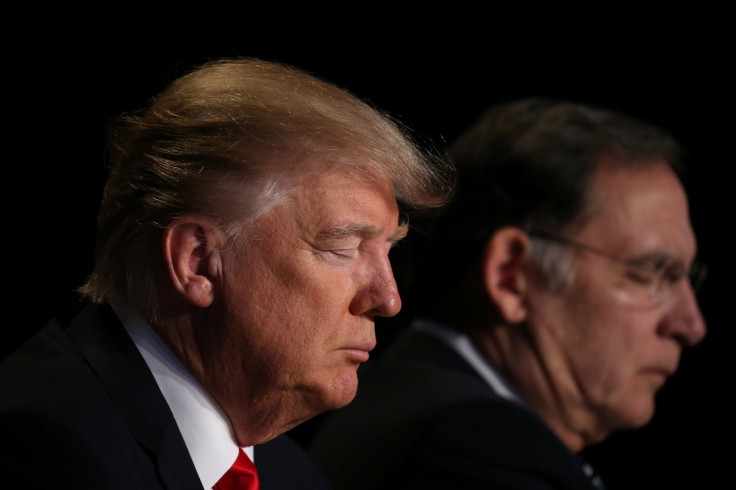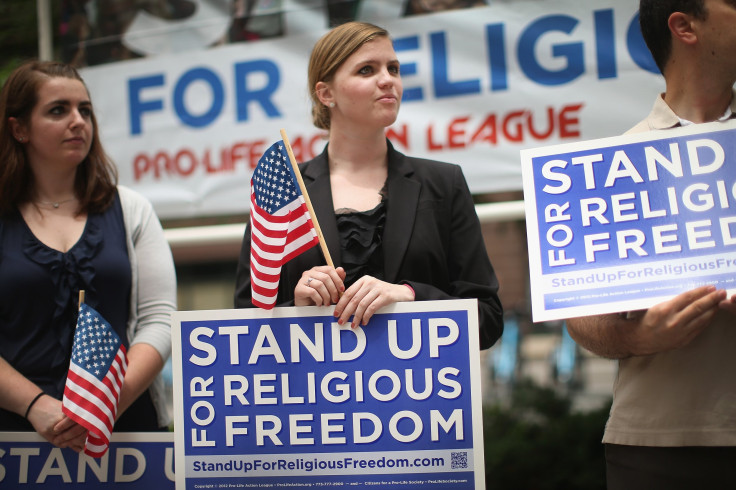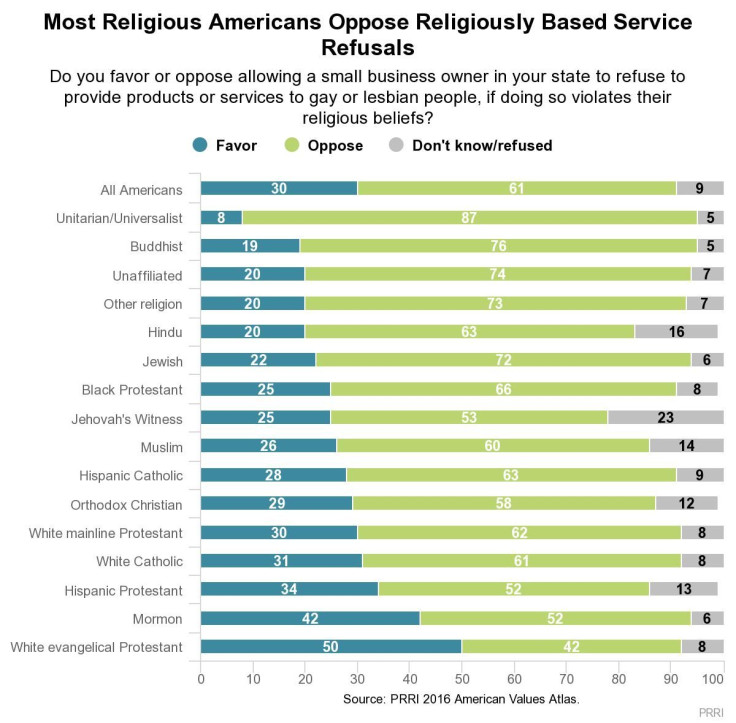Religious Freedom For All? Jews, Christians And Muslims Are Afraid Of Trump's Latest Policy

Since the start of the election campaign, Rabbi Jill Jacobs has seen swastikas graffitied at a subway stop near her Manhattan home and Jews subjected to a stream of abuse online suggesting Adolf Hitler was right all along. So when asked if she trusts that President Donald Trump truly cares about the religious liberty he vowed last week to “do everything to defend,” she has a very clear response.
“We have to stop calling it ‘religious freedom,’" she told International Business Times. “The executive order that was leaked or any bills that are likely to come out, they’re not about religious freedom, they’re about imposing one particular interpretation of Christianity on the entire country. It’s profoundly un-American.”
Trump has repeatedly decried what he has claimed is a war on Christianity in the United States. And his promise that he will lead the defense of Christianity has been accompanied by reports last week of an executive order that would offer religious groups greater exemptions from the law and undo the protections for the LGBT community established by his predecessor, President Barack Obama. The proposed legislation could also legalize discrimination not just against members of the LGBT community and women, but other faith groups.
Although it does not cite Christianity by name, the draft executive order specifically mentions exemptions for individuals and organizations on issues that have been prominent for the Christian right, such as abortion, pre-marital sex and same-sex marriage. An unofficial draft of the executive order on religious freedom obtained by The Nation last week received immediate backlash, including a letter signed by hundreds of faith leaders.
“Across the nation you see a number of gun ranges, restaurants and other shops putting out 'Muslim-free zones' or 'Muslims banned,'" Robert McCaw, director of government affairs for the Council on American-Islamic Relations, told IBT. “This is already happening, not only for the gay community but for Muslims, as well. And I can see this legislation just being used to further marginalize Muslims and people of the LGBT community alike.”
Trump's specific calls for religious liberty have especially provoked fear and memories of a painful history for religious groups that have previously suffered at the hands of legalized discrimination.
“In the early days of last century, there were signs that said, 'We don’t serve Jews, we don’t serve dogs,'” Michael Lieberman, Washington counsel for the Anti-Defamation League, a Jewish civil-rights organization, told IBT. “That was just out and out anti-Semitism and bigotry. And the same here."
Non-Christians aren't just closely watching Washington. With the election of Trump, religious freedom legislation is seeing a renewed push both at the state and national level. These bills seek to tilt the scale further toward the defense of religious beliefs, offering individuals and businesses exemptions from complying with the law if they can claim it burdens their religious views. A state religious freedom law in Mississippi last year, for example, would have enabled discrimination against LGBT people. It was struck down in court. In practice, the religious freedom laws would, for example, give a baker license to refuse to provide a cake for a same-sex wedding.
Such policies are aimed at undoing the past eight years of progressive government. Obama's White House saw not only a Supreme Court ruling that states must allow same-sex marriage, but also the passage of the Affordable Care Act, which stipulated that employers need to provide health care for their employees that covers all forms of contraception at no cost.
One of the most famous cases that arose from that stipulation involved the company Hobby Lobby, which argued the owners' religious beliefs prohibited them from providing coverage for drugs that end human life after conception. In the end, the Supreme Court ruled in the company's favor, allowing closely held for-profit corporations to be exempt from the law if there is a less restrictive means of furthering the law’s interest.
One of the law firms supporting Hobby Lobby in that case was the Becket Fund, which specifically takes on religious liberty cases. Becket senior attorney Mark Rienzi said he hopes that many of the burdens placed on religious groups during the Obama years will be rolled back under Trump.
“I think there are some things that President Obama did that were clear over the top culture war fights that were no good for anybody,” Rienzi said. “It was a dumb culture war fight. The aggressive views of the Obama administration, I think were bad and wrong and I think probably cost them a whole lot of votes.”

The message has some support within the religious community, too. The United States Conference on Catholic Bishops urged "the new administration in the strongest terms to take immediate steps to protect the people of faith from discrimination by the federal government," in a statement given to IBT by the organization's public affairs department.
Obama's executive order in 2014 that protected federal employees from anti-LGBT discrimination has also experienced a push back. Last year, an amendment was added to a defense bill that would have expanded religious exemptions for federal contractors. The amendment was eventually removed and the Trump White House earlier this week said that they would continue Obama’s executive order.
But the man who authored the amendment, Republican U.S. Rep. Steve Russell of Oklahoma, has made it clear he wants to eradicate the provisions included in Obama’s executive order. Russell has said he is not giving up the fight and that he had been given “good assurances” from the new administration that it would address the issue.
To Russell, the debate is a clear case of the religious versus those who stand in opposition to all religion.
“Maybe they want to silence and discriminate against people of faith,” he said. “It does not mean that we allow the atheists or the anti-religionists to force their unbelief on those people of faith that they can no longer exercise their religion because they’re not accommodating.”
With a Republican-controlled House and Senate, a Republican in the White House and likely soon to be a Conservative-leaning Supreme Court, other conservatives are also gearing up for a fresh fight that they believe they can now win. The First Amendment Defense Act, which would prohibit the federal government from taking any "discriminatory action" against any person or business that discriminates against LGBT people, is set to be reintroduced in an updated form by Sen. Mike Lee (R-Utah) and Rep. Raul Labrador (R-Idaho) after failing last year, although no timeline has yet been set.
But when Republicans lawmakers talk about religious freedom, they often seem to be talking about their own personal beliefs. The vast majority of lawmakers in Congress are Christian. A survey conducted by the Public Religion Research Institute (PRRI), released earlier this week, indicated that of all religious groups, only white evangelical Protestants were more in favor of religious protections than against.

Ira Lupa, a professor emeritus at Georgetown University Law School and an expert on the Constitution’s religious clauses, said a federal religious liberty law would violate the Establishment Clause of the First Amendment, which states that “Congress shall make no law respecting an establishment of religion.”
“When the United States says we’re going to lift up one set of religious views about marriage against a different and opposing set of religious views, they’re taking sides in a matter of religious controversy and that is always going to create an Establishment Clause problem,” he told IBT.
Views on the issues that are specifically addressed in the draft executive order are far from uniform across religious groups. In the case of same-sex marriage, the PRRI survey indicated that of all religious groups, only white evangelical Protestants, Mormons and Jehovah’s Witnesses have a majority in opposition. Together, they make up 28 percent of the U.S. population, according to a 2015 Pew Research Study.
The situation is similar in cases concerning abortion, where Jewish law makes clear that the life of a mother comes first and that life begins at birth and not conception.
“What happens when Christianity starts to impose prioritizing saving the life of the fetus even when that might mean the death of the mother?” said Jacobs, who was one of the signatories on last week's letter to Trump. “That is absolutely an imposition of Christianity on my faith and possibly on the faith of a Jewish doctor or a Jewish nurse.”
In some instances, the fact that the architects of religious liberty legislation don’t have a cross-section of beliefs at heart is explicit. While Trump has been openly advocating for greater religious freedom, hate crimes targeting Jews and Muslims have experienced a considerable spike. He has also surrounded himself with several advisers who have been accused of Islamophobia and white nationalism. One deputy assistant to the president, Sebastian Gorka, has previously called the U.S. a "Christian nation."
True religious freedom is a delicate balance between “whether there’s a burden on religion and whether the government has a compelling interest in burdening that religion,” said Holly Hollman, the general counsel for the Baptist Joint Committee for Religious Liberty.
While the name of the education and advocacy organization might suggest they would be in support of all religious liberty cases, the Baptist Joint Committee issued a friend-of-the-court brief defending the sufficiency of the government’s religious accommodation in mandating contraception coverage in the 2016 Supreme Court case Zubik v. Burwell, which aimed to take the Hobby Lobby victory a step further. Hollman said such cases and legislation like the proposed executive order from Trump could ultimately end up doing huge damage to one of the founding and most treasured principles of the country.
“Efforts that purport to advance religious liberty and yet would harm other important civil liberties or would put the government in the position of advancing religion ultimately threaten religious liberty as we have known and benefited from," Hollman said.
© Copyright IBTimes 2025. All rights reserved.





















